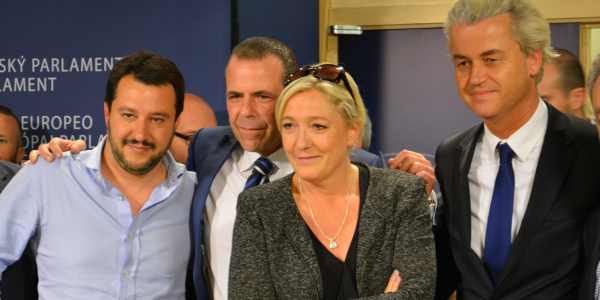Most populist radical right parties across Europe are not eager to leave the EU
After the 2016 Brexit referendum, there was speculation that other Eurosceptic parties across the EU would try to capitalise on the result and advocate their own countries’ exit. However, Stijn van Kessel finds that any initial enthusiasm among populist radical right parties for EU-exit quickly faded, and most have been muted or equivocal in their Euroscepticism, concentrating instead on more immediate concerns of voters, who generally do not prioritise the EU.

Picture: Euractiv.com/(CC BY-NC-SA 2.0) licence
After the UK’s referendum vote back in 2016, Eurosceptics across Europe cheered. The most fervent ones saw the imminent departure of the UK as an example to be followed, while others at least considered the Brexit vote as a sign that the EU was in need of fundamental reform. There were voices, also beyond Eurosceptic circles, that spoke about a potential ‘domino effect’ with other countries following suit and leaving the EU. Now that the UK has finally left, few countries seem to have been inspired by the British example. If anything, the apparent general trend across member states has been an increase in public support for EU membership.
The findings in our recently published article suggest that early predictions of an imminent domino effect were always questionable. We focused on parties of the populist radical right (PRR), considered to be the most likely instigators of such an effect. Yet, as our analysis showed, even the most passionately Eurosceptic politicians were typically reluctant to campaign for their countries’ exit from the EU.
Parties of the populist radical right, which are characterised by anti-immigration positions, opposition to cultural change and populist anti-establishment discourse, criticise the EU for a variety of reasons. They lament the loss of national sovereignty which they associate with deeper European integration, and dislike the opening of borders, as well as the EU’s supposed undemocratic and elite-centred nature. In our study, we focused on populist radical right parties in four founding EU member states: Partij voor de Vrijheid (PVV) in the Netherlands; Front National (FN; now re-named Rassemblement National) in France; Alternative für Deutschland (AfD) in Germany and Lega Nord (LN; later known as Lega) in Italy.
We asked whether these parties were inspired by the Brexit vote in their national election campaigns, which in all cases took place within two years of the British referendum. Did they draw attention to Brexit, and increase their more general emphasis on the topic of European integration? Did they bolster their Euroscepticism and demand a similar EU membership referendum in their own country, or even a unilateral withdrawal from the bloc?
Table 1: Main populist radical right (PRR) parties in national elections in four European countries

Source: van Kessel, S., Chelotti, N., Drake, H., Roch, J., & Rodi, P. (2020). Eager to leave? Populist radical right parties’ responses to the UK’s Brexit vote. The British Journal of Politics and International Relations, 22(1), 65–84.
What is evident from our results is that populist radical right parties initially reacted with some gusto to the Brexit vote. PVV leader Geert Wilders congratulated the British on their ‘Independence Day’, and argued that the Dutch deserved their own referendum. Italy’s LN declared that the British had ‘taught us a lesson in democracy’, whilst FN’s leader Marine Le Pen was similarly unequivocal in her praise for Brexit and her demand for a referendum in France. In the same vein, Alice Weidel of Germany’s AfD floated the idea of holding similar membership referendums across Europe.
Yet we also found that the Brexit vote failed to leave a more lasting mark on the strategies of populist radical right parties. European integration, in general, did not feature prominently in most of their election campaigns. The case of Marine Le Pen, for whom ‘returning France’s sovereignty’ was a key campaign pledge, was possibly the exception. Prior to the second round of the presidential elections, however, she placed less emphasis on the EU, and her position, not least pertaining to the common currency, became more ambiguous. The Dutch PVV, on the other hand, already favoured a ‘Nexit’ well before the British referendum. In the 2017 parliamentary election campaign, however, party leader Wilders preferred to prioritise his central theme of ‘Islamisation’.
Apart from the PVV, the other three of these parties ultimately shied away from advocating their countries’ unilateral withdrawal from the EU. Expressions of support for revoking membership or a membership referendum were typically voiced in a careful and non-committal manner: ‘ending EU membership may be a necessary only if the EU fails to reform’. A survey of other countries reveals that such a position can be found widely among populist radical right parties across Europe.
The muted responses of populist radical right parties to Brexit can be explained partly in terms of the relatively small appetite among European citizens for leaving the EU, but also the comparatively low salience of the issue of European integration. As long as populist radical right parties are successful by focusing on more tangible issues that are considered more important by their voters – not least those related to immigration and cultural change – their leaderships have little reason to take a risk and focus on themes that potentially divide their electorates or parties. This is even the case in countries, like France and Italy, where Euroscepticism has reached considerable levels. At the same time, as Duncan McDonnell and Anika Werner have argued, populist radical right parties ‘enjoy flexibility on European integration and can shift positions’ precisely because of the issue’s limited salience among supporters and the public at large.
The uncertainty of the outcome of the protracted Brexit negotiation process, as well as the political instability in the United Kingdom, are likely to have further induced a cautious ‘wait-and-see’ approach among populist radical right parties. In the longer run, when there is more clarity about the UK’s fate, there may well be renewed calls for leaving the EU. Yet this probably requires an increase in salience of EU-related issues and a concomitant rise in ‘exit scepticism’ among European citizens.
This article gives the views of the author, and not the position of Democratic Audit. It was first published by The UK in a Changing Europe, and is republished with permission.
The article ‘Eager to leave? Populist radical right parties’ responses to the UK’s Brexit vote’ appeared in The British Journal of Politics and International Relations (volume 22, number 1) and was co-authored by Stijn van Kessel, Nicola Chelotti, Helen Drake, Juan Roch and Patricia Rodi. The research was part of the ESRC-funded project ’28+ Perspectives on Brexit: a guide to the multi-stakeholder negotiations’ [grant number ES/R001847/1], led by Prof. Helen Drake.
About the author

Stijn van Kessel is Senior Lecturer in European Politics at Queen Mary University of London. His main research interests are populism, Euroscepticism and pro-European activism. He published mainly on the ideology, voters, and electoral performance of populist parties in Europe, with a particular emphasis on the radical right. He is joint convenor of the European Consortium for Political Research (ECPR) Standing Group on Extremism & Democracy, joint editor of the Routledge Extremism & Democracy book series, and joint editor of the journal Politics. He is also the author of the monograph Populist Parties in Europe: Agents of Discontent (Palgrave Macmillan, 2015), and published articles in journals including European Journal of Political Research, West European Politics, Government and Opposition, British Journal of Politics and International Relations, Journal of European Integration and Journal of Political Ideologies.





 Democratic Audit's core funding is provided by the Joseph Rowntree Charitable Trust. Additional funding is provided by the London School of Economics.
Democratic Audit's core funding is provided by the Joseph Rowntree Charitable Trust. Additional funding is provided by the London School of Economics.